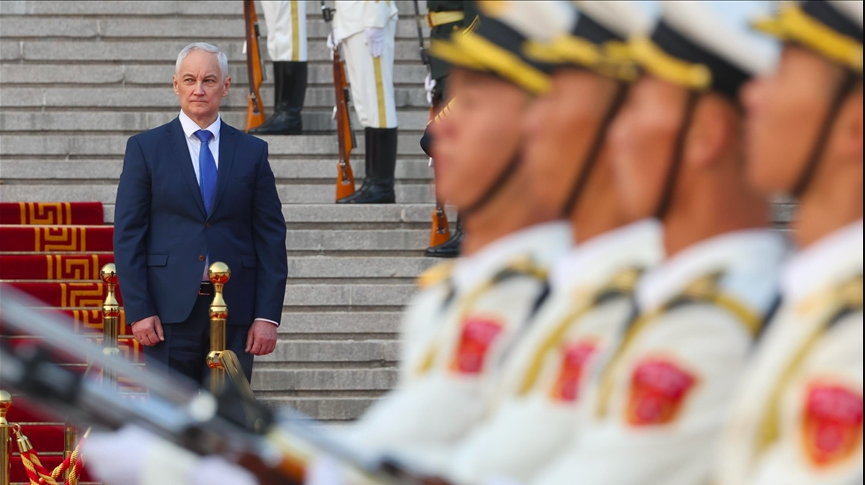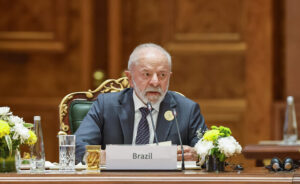
Published 10/15/2024 15:59 | Edited 10/15/2024 16:58
The growing partnership between Russia and China, highlighted by the visit of Russian Defense Minister Andrei Belousov to Beijing this Monday (14), reflects an increasingly solid alliance that directly challenges Western hegemony, especially that of the United States. The meeting takes place in the context of strengthening military relations between the two countries, which have coordinated a joint response to a series of global challenges, from sanctions imposed on Russia to pressure on China in relation to Taiwan.
“We have had very substantial conversations with the Chinese Defense Minister and we see that we have common views, a common assessment of the situation and a common vision of what we need to do together,” Belousov said during the meeting. The representative of the Chinese government, Zhang Youxia, said he expected “a strengthening of relations between the Armed Forces of Russia and China”, according to his words translated into Russian and cited in the statement.
Also on Tuesday (15), the Russian government said it will enter into a military treaty with North Korea. The alliance, the Kremlin said, will mean that the armed forces of both countries will be able to defend each other in the event of third-party aggression. Kremlin spokesman Dmitry Peskov said the treaty will be “strategic cooperation” in all areas, including military. And he said Moscow would share more details of the deal once it was concluded.
Turbulent seas of China and Korea
The Sino-Russian alliance, reflected in this Belousov meeting in Beijing and in the growing military, diplomatic and economic ties between the two countries, represents one of the most important geopolitical developments of the last decade. As the West continues to sanction Russia and curb China’s influence, Moscow and Beijing are intensifying their cooperation, challenging US hegemony and shifting the global balance of power.
Along with this, the announcement of a military treaty between Russia and North Korea represents a significant milestone in the geopolitical configuration of Asia and beyond. Strategic cooperation between the Armed Forces of the two countries, which includes mutual support in the event of external aggression, raises important questions about regional and global security. The Kremlin did not give full details about the agreement, but highlighted that it will cover military and strategic areas.
This development comes at a time of rising tensions on the Korean Peninsula and on the international stage. The announcement of the military alliance between Russia and North Korea came on the same day that the North Korean regime blew up sections of roads and railway lines on the border with South Korea. In response, the South Korean military fired warning shots.
Military alliance and strategic partnership
During the meeting with Chinese Defense Minister Zhang Youxia, Belousov emphasized the convergence of views between Moscow and Beijing, especially in the field of security. Both countries, according to the Russian minister, share not only a common assessment of global threats, but also an aligned vision on how to deal with these challenges. The focus of the conversation was the need to deepen military cooperation, strengthening a partnership that has already materialized in joint exercises and the coordination of defense policies.
The importance of this alliance was highlighted by the promise of “a new era” in Sino-Russian relations, made by Vladimir Putin and Xi Jinping in May 2024. The military partnership is seen by both sides as a way to counterbalance US influence. on the global stage, especially in regions such as East Asia and the Middle East. This Moscow-Beijing strategic axis directly challenges Western attempts to isolate Russia after the invasion of Ukraine, in addition to reinforcing China’s position in its regional disputes, particularly in relation to Taiwan.
Common challenges: Ukraine and Taiwan
One of the central points of this alliance is mutual support on sensitive international issues. Russia consistently supports China in its policy towards Taiwan, criticizing the US’ “deliberate attempts” to increase tensions in the region. The recent intensification of Chinese military activities around Taiwan, interpreted as a response to the island’s attempts at independence, is in line with Beijing’s rhetoric that Taiwan has never been a sovereign country.
The alliance between Russia, North Korea and China forms a triangle of cooperation that directly challenges the geopolitical order dominated by the United States and its allies. To the US accusation that Beijing is supplying materials that could be used in the conflict, China positions itself as a silent ally, officially denying the supply of weapons, but maintaining robust trade with Moscow, defying Western sanctions. Even if China denies direct involvement, the economic and political alliance between the two countries continues to be an obstacle to Washington’s isolation strategy.
Global implications of the Sino-Russian partnership
The strengthening of military and diplomatic relations between Russia and China has profound implications for global geopolitics. The alliance between the two powers forms a significant counterweight to the world order led by the US and its allies, creating a new power bloc with considerable influence in strategic regions. Coordination between Moscow and Beijing goes beyond defense issues, encompassing areas such as economics, technology and diplomacy, in a clear effort to redraw the global balance of power.
The Sino-Russian relationship becomes even more relevant at a time of geopolitical transition. Western sanctions against Russia have pushed Moscow to look east for support, while China faces increasing pressure from the US over trade and security issues. The union of military and economic efforts between the two powers has the potential to change the global strategic scenario, hindering the West’s ability to influence events in regions such as Asia-Pacific and Eastern Europe.
The role of the US and the future of global security
The Russia-China alliance presents a direct challenge to US foreign policy, which has for years sought to contain the rise of China and isolate Russia following its invasion of Ukraine. The partnership between Moscow and Beijing, however, suggests that these strategies may be being thwarted, with the two nations forming a coalition that not only resists external pressure but also seeks to expand its influence in key areas.
For the United States, responding to this new power configuration will require a combination of diplomacy and strengthening regional alliances. The US military presence in Asia, close relations with allies such as Japan, South Korea and Taiwan, and continued support for Ukraine are pillars of this strategy. However, growing Sino-Russian cooperation suggests that a new global order may be forming, with greater polarization between the West and this emerging power bloc in the East.
The new military partnership between Russia and North Korea and the strengthening of Sino-Russian relations present serious challenges to regional and global stability. On the one hand, the alliance with Pyongyang could encourage North Korea to adopt a more aggressive stance, feeling supported by a nuclear power like Russia. On the other hand, closer ties with China could accelerate the formation of a power bloc that seeks to counterbalance Western hegemony.
Source: vermelho.org.br

